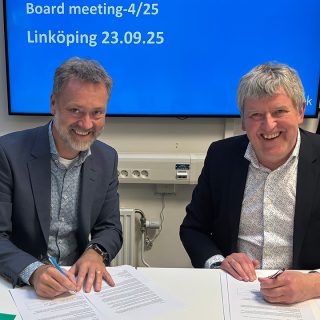Motivation and approach
The Co-op concept was introduced at the Faculty of Science and Technology, Umeå University already in 2013 and it allows future engineers to alternate their studies with supervised and paid work periods at industrial companies. The purpose of Co-op is to give engineering programme students the opportunity to apply their theoretical knowledge in practice, to bring new knowledge and perspectives to the external company, and to contribute to the supply of skilled engineers.
The idea of Co-op came originally from demand of the manufacturing industry for increased student collaboration. Similar initiatives can be found at other educational institutions (such as University West in Sweden). In Umeå, the work periods are arranged during the summer (teaching-free periods. This means that the work periods do not need to be integrated into the programme syllabi, which is common in Co-op elsewhere. One can say that we have an adapted Co-op model for our engineering programmes. During the final semester, the Co-op students also write their degree project in collaboration with the external company.
How the Co-op model is implemented
The Co-op model has been implemented in several engineering study programmes at the university, including the Master of Science Programme in Industrial Engineering and Management, the Bachelor of Science programmes in Civil Engineering, Mechanical Engineering, Electronic and Computer Engineering/Medical Engineering. The external companies offer several Co-op positions each year, and students must apply for these positions competitively, just like applying for a regular job. About one-third to half of the students can get a Co-op position. The study programmes currently collaborate with industrial companies and organizations in the Umeå region (Västerbotten) and regions close (Västernorrland).
The students who do not have a Co-op position still can benefit from the concept as the Co-op companies contribute with project tasks to be worked on in project courses given within the study programmes. An example of such a course is “Advanced project in building engineering, 15 ECTS”. Those who do not have a Co-op position are given the opportunity to work in a company-related student project and collaborate with the Co-op company. In this way, industrial knowledge is spread to the entire student group, even among the students who do not have their own Co-op position.
The Co-op coordinators, working at the Research support and collaboration office, work continuously to find more companies that want to join Co-op. This often happens through proactive contact or employers learning about Co-op through various information channels, and subsequently contact the university. The coordinators meet with the employers, explain the Co-op model, and manage any participation as soon as the employers decide they want to join the Co-op collaboration.
Student Experience/Feedback
Students participating in Co-op get the opportunity to apply their theoretical knowledge in practice, which increases their motivation to continue their studies. They also gain valuable work experience and contacts in the industry. Their feedback has been overwhelmingly positive. The students often highlight the benefits of alternating theory and practice during their studies, gaining work experience in the industry, getting a valuable merit in their CV, contacts and company networks, salary during work periods as well as increased study motivation.




